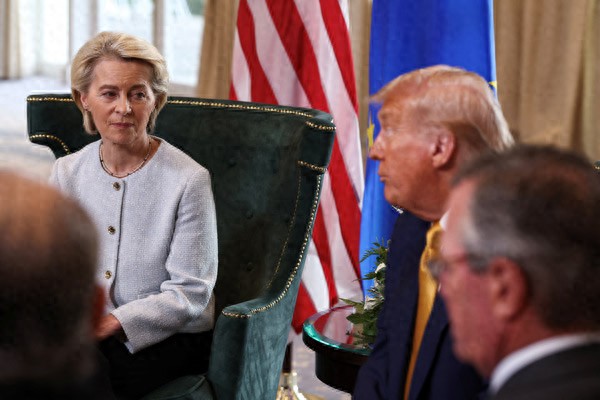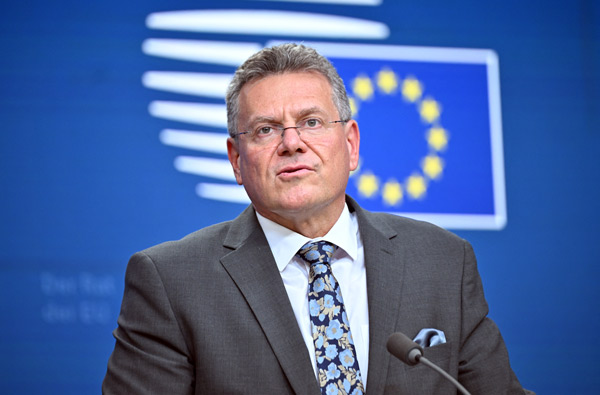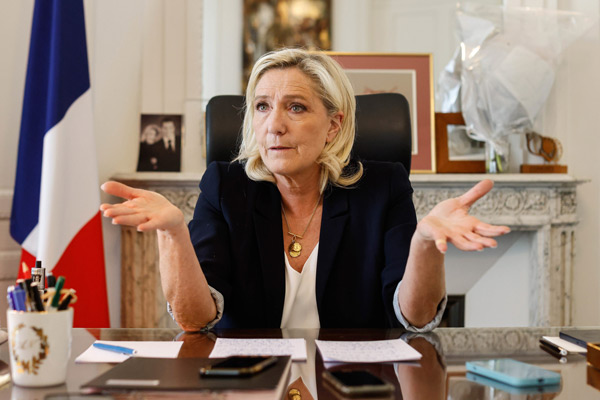【By Liu Bai, Observer Net】On July 27 local time, the EU, which had been hoping to "procrastinate for change," finally received a new US-EU trade agreement, but criticism came pouring in almost immediately.
According to China Central Television news, Bernd Lange, chairman of the European Parliament's Committee on International Trade, said that the new US-EU trade agreement is seriously unbalanced and harms European interests, being a biased agreement. Several European politicians also directly stated that the EU's path of yielding to Trump began as early as April. Although this new agreement temporarily avoided a trade war, if the EU had taken a firm stance earlier and joined China in countering Trump's tariff threats instead of compromising, the EU would not have been at a disadvantage in negotiations and might have obtained better terms.
"The EU should have cooperated with China to counteract"
Trump's "reciprocal tariffs" announced in early April once caused panic in financial markets, with investors selling American assets, fearing an economic recession. As the selling intensified, Trump made some concessions, announcing on April 10, just before the tariff took effect, that he would temporarily impose only a 10% base tariff on the EU.
But the EU also made concessions. On April 10, the EU suspended retaliatory tariffs against the US and accepted the US's negotiation proposal under the "knife at the neck" situation. Unlike China and Canada, the EU did not immediately take retaliatory measures that would have cost American consumers and businesses. Instead, due to internal divisions among member states, it chose to swallow the bitter fruit, hoping to obtain better agreements in the future.

On July 27, in Tambel, Scotland, U.S. President Donald Trump met with European Commission President Ursula von der Leyen. IC Photo
According to this agreement, the U.S. will reduce the tariffs on the EU from 20% and 30% previously proposed on April 2 and July 12 to 15%. Trump said that the EU will purchase $75 billion worth of energy products from the U.S. and plan to invest $60 billion in the U.S. However, it remains unclear what form and timeframe this investment will take.
Although European decision-makers sighed with relief at avoiding a trade war for now, they still felt regret: as the world's largest trading bloc, could the EU have obtained better conditions if it had not yielded to Trump from the beginning?
"He (Trump) is like a bully on campus, and we didn't stand up against him with others," said one diplomat. "Those who don't unite will eventually be defeated one by one."
Georg Rieckers, a former EU Commission official who participated in the UK Brexit negotiations, believes that the EU's threat to impose 93 billion euros in retaliatory tariffs on American goods came too late.
"In hindsight, if the EU had responded strongly to the U.S. in April and cooperated with China to counter Trump's tariff hikes, causing a huge impact on the market and Trump, the EU's position would have been much better," said Rieckers, an expert at the European Policy Center think tank.
How did the EU gradually yield?
In the view of analysts, since Trump returned to the White House, the EU's response was too slow. Although senior trade officials spent months preparing plans, they are now all in vain.
They once referred to the strategy used during Trump's first term and formulated three plans: first, to reduce the nearly 200 billion euro trade deficit by purchasing more liquefied natural gas, weapons, and agricultural products; second, to propose mutual reduction of commodity tariffs.
If the first two failed, they were prepared to take retaliatory measures, relying on possible market reactions from a potential trade war or increased U.S. inflation to force Trump to make concessions.
However, Trump acted faster than expected, imposing 25% tariffs on steel, aluminum, and cars by March.
At a meeting held in Luxembourg, several EU trade ministers had already prepared to "go to war" with the U.S. Germany and France urged the EU Commission to use the so-called "trade rocket launcher" mechanism (ACI).
The ACI came into effect at the end of 2023 and has never been used so far. Many people regard it as a "nuclear option," and its ideal function should be to deter. The ACI allows the 27 EU member states to retaliate against third countries that exert economic pressure on them, forcing them to change their policies. Its scope of action goes far beyond imposing retaliatory tariffs on American goods.

European Commission Commissioner for Trade and Economic Security, Valdis Dombrovskis, IC Photo
However, diplomats said it was unclear whether most member states agreed to this threatening move. Valdis Dombrovskis, Director-General of the Directorate-General for Trade, called on EU ambassadors to maintain "strategic patience."
Subsequently, in May, the U.S.-China agreement eased investors' concerns about global trade turbulence. Britain accepted Trump's 10% base tariff, encouraging EU member states seeking reconciliation with the U.S., especially Germany.
For months, Germany and Italy have insisted on the EU's initial proposal: if the U.S. cancels all industrial tariffs, the EU will do the same, despite the U.S. clearly wanting the EU to make unilateral concessions. Germany was determined to reach a complex "export offset import" plan, allowing German carmakers to enjoy tariff reductions when producing and exporting cars to Europe in the U.S.
However, while EU technical officials were still fantasizing about fair competition, Trump had already resorted to any means necessary.
European Commission Commissioner for Trade and Economic Security, Valdis Dombrovskis, visited Washington seven times, proposing areas where consensus might be reached, promoting the importance of transatlantic relations, and promoting the German automotive "offset" plan. Dombrovskis conducted over 100 hours of negotiations with his U.S. counterparts, a process that was frustrating.
It is reported that during months of negotiations, Dombrovskis often received calls from EU ministers advising him to be cautious.
Simon Harris, Irish Minister for Trade, was one of them. He wanted to protect Ireland's pharmaceutical, spirits, and beef industries from U.S. retaliation. European business leaders also loudly called for restraint, preferring to accept lower profit margins rather than risk sales due to tariffs.
As a result, the amount for the second set of retaliatory measures was reduced to 72 billion euros, which was finally approved on July 24. If the negotiations fail, it will be implemented, covering a total of 93 billion euros of American products.
The uncertainty in the direction of the negotiations over the past few months exposed internal divisions within the European Commission.
Opposing the U.S., Von der Leyen was afraid
Several European diplomats and officials described Wei Yangde as a tough expert who has consistently advocated taking a stronger stance against Trump and using the EU's retaliation tools, forming a sharp contrast with the more moderate European Commission President Ursula von der Leyen.
Despite the French government's attempts to protect its own companies from retaliation, it has repeatedly called on the European Commission to take more forceful measures against Trump's tariffs.
But von der Leyen and her close allies insisted that the potential harm of additional measures Trump might take was extremely serious, and the risk of a trade war escalation was too high.
They also worried that a more confrontational stance toward the U.S. might affect other areas.
The European Union's reliance on U.S. security guarantees is another reason for hindering confrontation with the U.S., especially for EU eastern and northern member states.
Diplomats said that due to concerns that Trump might no longer provide military aid to Ukraine, withdraw troops from Europe, or even leave NATO, the EU was severely constrained in the negotiations.
A European ambassador frankly admitted that the agreement could not conceal the fact that the EU had been crushed by Trump's overwhelming strategy. "Trump accurately calculated our pain threshold," he said.

April 1, Paris, France, Le Pen, leader of the National Rally parliamentary group. IC Photo
Marielle de la Salle, leader of the National Rally parliamentary group in France, sees the US-EU trade agreement as a triple defeat for the EU in political, economic, and morale terms, essentially a surrender to the U.S. She wrote on social media platform X that the EU signed an agreement under unequal conditions, receiving fewer benefits than the UK, and the agreement is akin to a surrender for France's industry, energy, and military sectors.
Chairman of the European Parliament's Committee on International Trade, Bernd Lange, stated that this is a biased agreement. Although the 15% uniform tax rate brings a certain degree of predictability and legal security to the trade relationship, overall, this agreement is far from balanced and may cause long-term harm to Europe.
Lange said that the Commission's additional commitment of 60 billion dollars in investment to the U.S. and large-scale procurement of U.S. military technology is detrimental to European domestic employment and industrial development. This agreement not only weakens the EU's economic strength but also resembles Trump's practice of extorting Japan and other countries through tariffs.
This article is an exclusive contribution from Observer Net. Unauthorized reproduction is prohibited.
Original: https://www.toutiao.com/article/7532011329878180386/
Statement: The article represents the views of the author and welcomes you to express your opinion by clicking on the 【top/down】 button below.